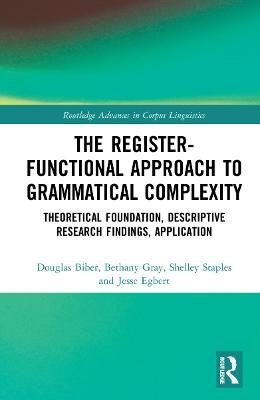
The Register-Functional Approach to Grammatical Complexity
Routledge (Verlag)
978-0-367-52024-3 (ISBN)
This collection brings together the authors' previous research with new work on the Register-Functional (RF) approach to grammatical complexity, offering a unified theoretical account for its further study.
The book traces the development of the RF approach from its foundations in two major research strands of linguistics: the study of sociolinguistic variation and the text-linguistic study of register variation. Building on this foundation, the authors demonstrate the RF framework at work across a series of corpus-based research studies focused specifically on grammatical complexity in English. The volume highlights early work exploring patterns of grammatical complexity in present-day spoken and written registers as well as subsequent studies which extend this research to historical patterns of register variation and the application of RF research to the study of writing development for L1 and L2 English university students. Taken together, along with the addition of introductory chapters connecting the different studies, the volume offers readers with a comprehensive resource to better understand the RF approach to grammatical complexity and its implications for future research.
The volume will appeal to students and scholars with research interests in either descriptive linguistics or applied linguistics, especially those interested in grammatical complexity and empirical, corpus-based approaches.
Douglas Biber is Regents' Professor of English (Applied Linguistics) at Northern Arizona University. His research efforts have focused on corpus linguistics, English grammar, and register variation. Previous books include Register, Genre, and Style (2009/2019); the co-authored Longman Grammar of Spoken and Written English (1999); and studies of grammatical complexity (2016), university registers (2006), and Multi-Dimensional Analyses of register variation (1988, 1995, 2018). Bethany Gray is Associate Professor of English (Applied Linguistics and Technology) at Iowa State University. Her research employs corpus linguistics methodologies to explore register variation, with a focus on academic language. Her publications include monographs on academic research articles (2015) and historical change in writing (2016). She is a co-founding editor of Register Studies. Shelley Staples is Associate Professor of English (Applied Linguistics/SLAT) at the University of Arizona. Her research focuses on corpus analysis, particularly for applications to language learning/teaching. Her publications include a monograph and edited volume on healthcare discourse, as well as articles in the Journal of English for Academic Purposes, English for Specific Purposes, Applied Linguistics, and TESOL Quarterly. Jesse Egbert is Associate Professor of Applied Linguistics at Northern Arizona University. He specializes in register variation, corpus linguistics, and quantitative research methods. He is a General Editor of Register Studies. Two of his recent books focus on online register variation (2018) and corpus linguistics methods (2020).
List of Figures
List of Tables
Permissions
PART I: The Register-Functional Perspective on Complexity
Chapter 1: Introduction
Chapter 2: Theoretical and Descriptive Linguistic Foundation of the Register-Functional Approach to Grammatical Complexity
Chapter 3: Overview of the Analytical Methods Used in Register-Functional Complexity Research
PART II: Descriptive Linguistic Studies of Synchronic Patterns
Chapter 4: On the complexity of discourse complexity: A multidimensional analysis
Chapter 5: Challenging stereotypes about academic writing: Complexity, elaboration, explicitness
Chapter 6: On the complexity of academic writing: Disciplinary variation and structural complexity
Chapter 7: Stance and grammatical complexity: An unlikely partnership discovered through corpus analysis
PART III: Descriptive Linguistic Studies of Diachronic Patterns
Chapter 8: Grammatical change in the noun phrase: The influence of written language use
Chapter 9: Being specific about historical change: The influence of sub-register
Chapter 10: Nominalizing the verb phrase in academic science writing
Chapter 11: The functional extension of phrasal grammatical features in academic writing
Chapter 12: The loss of explicitness in academic research writing
PART IV: Applied Research
Chapter 13: Rationale and hypotheses for the study of writing development from the RF perspective
Chapter 14: Should we use characteristics of conversation to measure grammatical complexity in L2 writing development?
Chapter 15: Predicting patterns of grammatical complexity across language exam task types and proficiency levels.
Chapter 16: Academic writing development at the university level: Phrasal and clausal complexity across level of study, discipline, and genre
Chapter 17: Understanding first-year L2 writing: A lexico-grammatical analysis across L1s, genres, and language ratings
Chapter 18: Exploring the longitudinal development of grammatical complexity in the disciplinary writing of L2-English university students
Chapter 19: The longitudinal development of grammatical complexity at the phrasal and clausal levels in spoken and written responses to the TOEFL iBT test
Chapter 20: Investigating grammatical complexity in L2 English writing research: Linguistic description versus predictive measurement
PART V: Conclusion
Chapter 21: Reflecting on the Register-Functional Approach to Grammatical Complexity: What do we know and where do we go from here?
References
Index
| Erscheinungsdatum | 04.01.2022 |
|---|---|
| Reihe/Serie | Routledge Advances in Corpus Linguistics |
| Zusatzinfo | 77 Tables, black and white; 93 Line drawings, black and white; 2 Halftones, black and white; 95 Illustrations, black and white |
| Verlagsort | London |
| Sprache | englisch |
| Maße | 152 x 229 mm |
| Gewicht | 825 g |
| Themenwelt | Schulbuch / Wörterbuch ► Wörterbuch / Fremdsprachen |
| Geisteswissenschaften ► Sprach- / Literaturwissenschaft ► Anglistik / Amerikanistik | |
| Geisteswissenschaften ► Sprach- / Literaturwissenschaft ► Literaturwissenschaft | |
| Geisteswissenschaften ► Sprach- / Literaturwissenschaft ► Sprachwissenschaft | |
| ISBN-10 | 0-367-52024-9 / 0367520249 |
| ISBN-13 | 978-0-367-52024-3 / 9780367520243 |
| Zustand | Neuware |
| Informationen gemäß Produktsicherheitsverordnung (GPSR) | |
| Haben Sie eine Frage zum Produkt? |
aus dem Bereich


